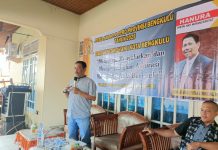As a crime reporter in San Francisco, I should have known better than to park my car under an overpass near the Hall of Justice, a nice stroller visible in the back seat.
And it couldn’t have hurt to check that I didn’t drop my keys onto the ground next to the vehicle as I scrambled to pay the meter and run to a court hearing.
Alas, the predictable outcome: As I sat in court taking notes, my phone vibrated with a text from my partner, Miguel, from our Oakland home. His phone was in communication with our Subaru Outback, which was moving.
“The alarm of the car went off was it you???”
I tried to respond but had no cell service in the granite-clad building. By the time I walked out of the courtroom a few minutes later, Miguel was frantic. The texts came tumbling out.
“Please tell me you are in the car cause if not our car got stolen.” “What is going on???” “So the front door is ajar now?” “I just hope you are ok.”
My first text back to Miguel was a profanity.
That afternoon, I joined a growing category of San Francisco crime victims: Those who report a theft while simultaneously tracking what was stolen through location-based technologies such as Bluetooth and GPS.
The Subaru’s alarm had apparently sounded because the thief used the key rather than the key fob to unlock the door. Now, Miguel could see the location of the car through the MySubaru app.
Simultaneously, he could view the location of our car seat, which we’d outfitted with an Apple AirTag in case of our child’s abduction, and the location of the car keys, which also had an AirTag to prevent me from constantly misplacing them.
Standing in my now-vacant parking spot, I called 911. I told the police dispatcher that Miguel was tracking everything from Oakland.
“Can someone please help me?”
Megan Cassidy’s vehicle was stolen and then damaged.
Ethan Swope/The Chronicle
That afternoon, May 19, was chaotic and humiliating, but it also presented a unique opportunity. For the first time in my career, I would be able to view my beat from the inside out.
In recent months, I’ve spoken to many theft victims who were able to pinpoint the location of their luggage, bicycles and other stolen goods.
While this technology has been around for years, police say its spread — particularly Apple’s introduction of the AirTag last year to compete with products like the Tile tracker and the Galaxy SmartTag — has prompted a boom in calls for help like mine.
As the Washington Post’s Heather Kelly wrote in an article in October, after tracking down her stolen Honda Civic in San Francisco, Apple’s marketing for the AirTag focuses on misplaced items and makes “no mention of crime, theft or stealing in any of the ads, webpages or support documents. But in reality, the company has built a network that is ideal for that exact use case.”
Recent stories have documented similar recoveries in Memphis, Atlanta and Seaford Rise, a suburb of Adelaide in Australia.
Tony Maozholds a gps tracker by his truck in San Francisco, Calif., on Friday, Aug. 19, 2022. Maoz’s truck has been stolen multiple times.
Ethan Swope/The Chronicle
Kenny Franks holds a gps tracker next to his luggage which was stolen and later recovered in San Francisco, Calif., on Friday, Aug. 19, 2022.
Ethan Swope/The Chronicle
Top: Rony Maoz holds a GPS tracker by his truck, which has been stolen multiple times. Above: Kenny Franks holds a GPS tracker next to his luggage, which was stolen and later recovered.
In San Francisco, a city rife with gadget-lovers and plagued by high property crime, the technology would seem to be a game changer. But in reality, situations like my stolen Subaru can often mired in unforeseen complications.
The response by police has at times been thwarted by legal constraints — for example, an officer generally can’t enter a home just because the Find My iPhone app says your cell is inside — and at other times by what victims say feels like apathy.
Police officials say the reality is that a stolen phone, bike or even car is not as high a priority as a violent crime, so cops don’t always have time to get involved and stay involved.
The result can be maddening for victims armed with case-cracking evidence. And while police say they always advise these victims against following their valuables into potentially dangerous situations, many people told me they felt they had no choice but to go cowboy.
Looking back at Miguel’s texts from May 19, it’s easy to see how the specter of danger immediately enters the equation.
“Be careful!!!!!” “It says the car is on!” “There could be someone in the car.” “MEGAN DO NOT CONFRONT ANYONE.”
I’ll admit, the possibility of vigilantism had crossed my mind. But the SFPD jumped on our case, even though it had no idea I was a member of the media.
After I reported the Outback stolen from the street outside the Hall of Justice, I connected the dispatcher to Miguel, who relayed the car’s path, turn by turn, in real time.
At about 4 p.m., seven blocks from where I stood, the car stopped.
Kenny Franks with his luggage that was stolen and later recovered in San Francisco.
Ethan Swope/The Chronicle
A little more than two weeks earlier, on May 3, Kenny Franks didn’t spot his suitcase at baggage claim at San Francisco International Airport. He figured it must have been misplaced by the airline, because an AirTag he had placed inside the luggage showed it was still tracking from SFO.
Franks filed a report with Alaska Airlines and left the airport about 7 p.m.
So when Franks saw the bag travel across town about 15 minutes later, he was disappointed to learn that an airline employee wasn’t delivering it to him. Rather, a thief was on the move.
Franks called police, and in multiple calls, he said, dispatchers instructed him to fill out a police report rather than try to retrieve the bag on his own.
Franks submitted a report at San Francisco’s Northern Station on Fillmore Street, but despite officials’ insistence, told police he would seek to retrieve the luggage with or without them. A dispatcher, he said, eventually agreed to send officers to a Super 8 motel on Lombard Street where the luggage seemed to have landed, and advised Franks to wait and not confront anyone.
When the officers showed up, Franks pointed them to the room from which his suitcase was locating. The cops knocked on the door. A man who answered the door demanded a search warrant, and the officers left, explaining to Franks that they couldn’t enter without one.
Franks — who eventually got the bag back after it was emptied and discarded — said he understood and that he empathized “with the fact that they have violent crimes going on that they also need to respond to.”
“If one of them had gotten hurt because of my silly luggage, I would have felt bad about it,” he said. “But it was very, very frustrating. I feel like there could have been more done.”
I also spoke to Kate Stoia, a Noe Valley resident and candidate for District Eight Supervisor, and her husband, Rony Maoz, who resorted to following his stolen truck around for hours last September.
Because it had been stolen twice before, Maoz had by then equipped it with a tracking device made by a friend’s startup. Driving another car, Maoz followed the signal and found the truck in the India Basin neighborhood. He called 911 and told a dispatcher he had eyes on the vehicle.
But when officers arrived and tried to pull over the suspect with lights and sirens, he sped off, police told Maoz.
Because of the inherent risks of high-speed chases, city policy doesn’t allow them in many circumstances. And Maoz said he was told by officers that they didn’t have time to keep following the suspect’s digital trail as he drove around the city. But if the man got out of the car, they told him, please call again. Help would be on the way.
So Maoz spent the day in a cat-and-mouse game. Every time the suspect parked, he said, he would call the police, who would say officers were responding — and then the man would take off again.
Ultimately, the thief abandoned the truck and Maoz got it back.
Rony Maoz’s truck has been stolen multiple times.
Ethan Swope/The Chronicle
Most of the people I interviewed for this story stressed that the cops they dealt with were polite and professional.
But Stoia and other victims also described what they characterized as a defeatist culture in the ranks, with officers blaming prosecutors, policy, state laws or time constraints for not performing what seemed to be standard police work.
Though most of the victims ultimately got their property back, they often did so by putting themselves at risk. Almost everyone I interviewed said it’s only a matter of time before a property-crime victim goes rogue and meets a tragic fate.
“The thing that is problematic is … this cannot lead to vigilantism, right? But eventually it will,” Stoia said. “One entity needs to have a monopoly on the use of force. And if they don’t use it responsibly, people are going to take action.”
According to one victim, this is already happening.
The man, who asked me not to use his name out of fear of retaliation, said he traced his stolen bike to tents under a freeway on Division Street, but was told by police that they couldn’t respond until the next day.
“So I went out with a baseball bat,” he said. “Found it and trashed the guy’s tent.”
Officer Kathryn Winters, a San Francisco police spokesperson, said police strongly discourage anyone from confronting a suspect over stolen property.
“The best thing they can do is stop and meet with us,” Winters said. “If their items are tracking, then we can take over the investigation.”
However, Winters said, unless the victim reports a serious crime like an accompanying robbery or assault, rather than a relatively low-level theft, police don’t always have the resources to dig in.
“The thing that is problematic is … this cannot lead to vigilantism, right? But eventually it will.”
— Kate Stoia, Noe Valley resident and candidate for District 8 Supervisor
And if the item tracks from inside a residence or hotel room — as in Kenny Franks’ case — Winters said Fourth Amendment protections require police to get a warrant.
“There’s a very high probable-cause standard that we have to meet to be able to get a judge to sign off on it,” Winters said. “And if we simply just say it’s tracking to this location, unfortunately a lot of times that’s just not good enough for a judge.”
Car theft victim Tyler Smith experienced still further limitations. When his Chevy Spark was stolen from the Mission District on April 8, he reported to police that he was tracking it via the car’s OnStar system. He said police instructed him to go to the location — and call them back when he spotted the vehicle.
The tracking app led Smith to a homeless encampment under a South of Market freeway overpass.
“It was a tiny one-way road,” Smith said. “I was pretty sketched out.”
Smith said he shuffled by his car quickly, trying to peer inside.
“But then (police) kept asking me questions like, ‘Can you see who’s in it? What do they look like? Can you confirm the plate?’” Smith said. “I was like, ‘No! I walked by, I saw it was there, and I can’t believe I had to do that.”
As Smith waited anxiously around the corner, he said, police arrived within about 20 minutes.
The officers and Smith approached the car again. They opened the door to find people living inside. The officers politely asked the occupants to leave, Smith said, and didn’t attempt to question them.
“They said they weren’t sure who stole the car — just because those people were in it doesn’t mean that they stole it,” Smith said. “So they couldn’t do anything.”
AnaÏs Gragueb also became her own sleuth after her electric bike was swiped from her apartment building’s garage last year, and she tracked it to an encampment near City Hall.
She said she begged a dispatcher to send help, but was told there was no guarantee.
So Gragueb, borrowing her wife’s bike and rode alone to the address, where she came upon a man doing drugs on the pavement next to a row of slick new bikes. Gragueb had promised her wife she wouldn’t approach anyone, so she rode a little farther along, until she saw a group of construction workers.
“I’m so sorry,” she said she told them. “But there’s my bike. It’s right there. I’m scared to go. I don’t see it, but I know it’s there. Would you mind just being next to me while I ask questions and ask for my bike back?”
Gragueb had an image of the suspected burglar on her phone, taken from her garage’s security camera footage. The construction workers, she said, recognized the man as someone who had vandalized their site, and one offered to escort Gragueb back to the scene.
After a brief confrontation with the suspect, Gragueb said, she spotted the tip of her bike wheel peeking out from under a tarp. With the construction worker’s assistance, she carried it back to the construction site and called police, who ultimately arrested the suspect.
“I felt like, if that’s not a moment in my life where I’m justified in calling the police — the moment where I know I’m going to be faced with somebody who’s committed a crime,” Gragueb said, “when are the police going to be useful?”
Winters said she wasn’t able to track down information on these specific incidents, but said, anecdotally, that they appeared to illustrate some of the complexities of such investigations.
“I felt like, if that’s not a moment in my life where I’m justified in calling the police — the moment where I know I’m going to be faced with somebody who’s committed a crime, when are the police going to be useful?”
— Anais Gragueb
Within 10 minutes of putting Miguel in touch with police, allowing him to relay information about our stolen Subaru, I received a call back from a dispatcher. Police officers had found my car, unoccupied, about four blocks away from where I had left it.
An officer waited at the location for me to arrive, and stood by as I surveyed the damage. Some of the contents of my car littered the street, including my infant’s tiny floral sneakers.
The stroller was gone, but the car seat — which is admittedly tricky to remove — was spared. Nothing else of value was there in the first place, but that didn’t stop the thief from making off with a car charger and some pennies he cut out of a soda can that we shake to stop our dog from barking.
And in the few blocks of his joyride, the thief also managed to sideswipe something sturdy enough to dislodge my bumper. I’m still working that out with insurance.
I got the car towed, because the officer couldn’t wait for my partner to arrive with the spare keys. He also didn’t want to leave me there alone, in case the thief came back. I understood.
Before we parted ways, the officer did a quick search for my keys, which were tracking from the same block. He poked his head into a tent and talked to a few apparent witnesses, but said the keys might have been inside a nearby building — and, if so, he couldn’t go in.
I felt relieved and thankful for the officer’s swift response.
The next day, Miguel and I returned to the scene. The keys, or at least the AirTag affixed to them, seemingly hadn’t moved since the day before. We debated asking police to escort us, but figured they probably had better things to do.
A group of people was smoking on the curb. We feared what might happen if we sent a signal to the tracker and it beeped from inside someone’s pocket. We tried anyway and played dumb, saying we’d dropped or keys in the area. Had anyone seen them?
Fortunately, the alert instead led us to a tree. There were the keys, hanging from a branch.
Later, my mom asked whether the thief would be arrested. Were there fingerprints taken? Evidence collected?
I said no — and until that moment it hadn’t occurred to me to ask. I just felt lucky to get my car back in one piece and grateful for the technology that allowed me to do so.
The incident also seemed to portend a brighter future: As more gadgets, bikes and cars are tracked, thieves may be deterred from stealing them at all.
But for those who persist, don’t we want them to fear the police are coming — and not their victims?
Megan Cassidy is a San Francisco Chronicle staff writer. Email: megan.cassidy@sfchronicle.com Twitter: @meganrcassidy
The post I tracked thieves stealing my car in S.F. Then I saw firsthand what police can — and can’t — do next first appeared on Eatory.my.id.

















